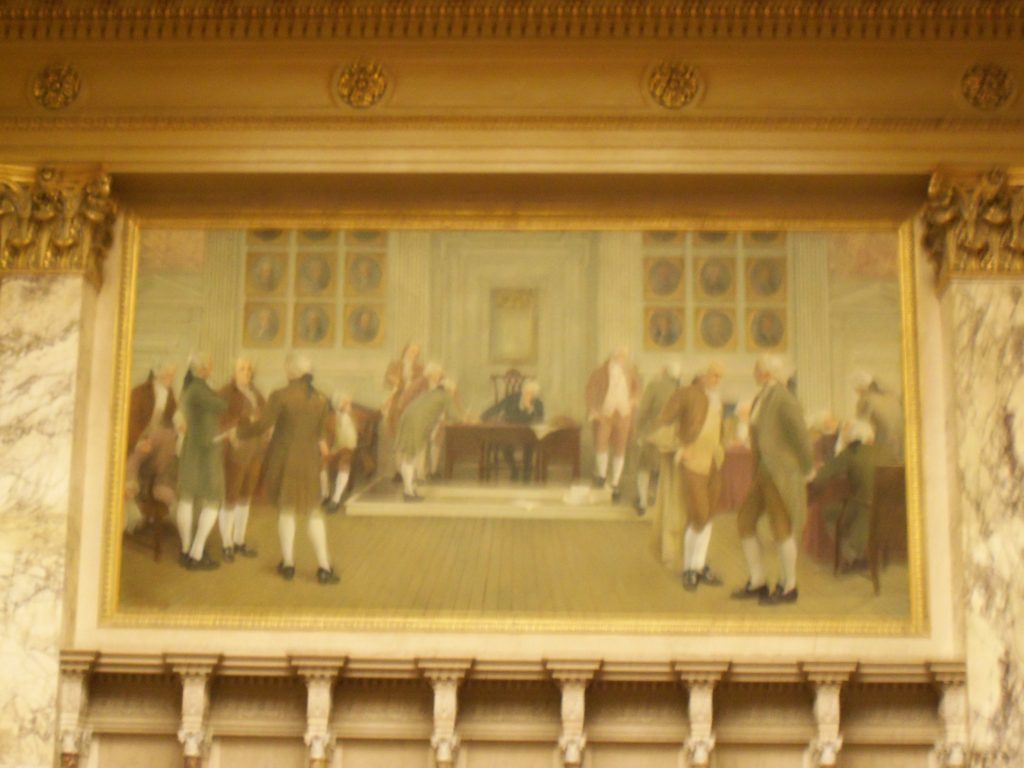Liberty Bell Replica. Wisconsin Capitol.
Friday, 12 April 2024
“King Agrippa, do you believe the prophets? I know that you do believe.” Acts 26:27
Note: You can listen to today’s commentary courtesy of our friends at “Bible in Ten” podcast. (Click Here to listen).
You can also read this commentary, scrolling with music, courtesy of our friends at “Discern the Bible” on YouTube. (Click Here to listen), or at Rumble (Click Here to listen).
In the previous verse, Paul noted to Festus that none of the things he was saying would have escaped the attention of Agrippa, since what he spoke of was not done in a corner. Now, he directs his attention and words directly to the king, saying, “King Agrippa, do you believe the prophets?”
Paul’s question is intended for a rebuttal to Festus’ accusation concerning his being insane. It is actually a rhetorical insinuation towards Agrippa. By asking this of him, it is intended to then highlight what any Jew would naturally believe.
But even more, Agrippa could not answer negatively. His position demanded that he avow the Scriptures as inspired and true, even if his interpretation of them may differ from Paul’s, just as a Sadducee’s might differ from that of a Pharisee.
And so, to avoid having Agrippa become forced into a theological debate which could only become a rabbit trail to the matter at hand, Paul immediately answers his own question in the affirmative, speaking for the king, saying, “I know that you do believe.”
The pressure that was imposed upon Agrippa is removed. The Scriptures existed and were the basis for the culture and religious life of the people. In the case of Paul’s question, it didn’t matter if Agrippa believed their source was from God (or if Agrippa had a varied interpretation, such as the differences between the Sadducees and the Pharisees), and Paul didn’t give him a chance to elucidate an answer.
Instead, Paul’s wording was chosen to silence the accusation of Festus for the sake of his defense. It was a brilliant way for Paul to get Agrippa to respond to the immediate words and to consider the greater subject, that of Jesus.
However the words of Scripture came to be, the important point is that they existed and that the words they consist of perfectly align with the Christian teaching about Jesus being Israel’s Messiah. That Paul’s intent in the choice of his words worked properly will be seen in Agrippa’s response.
Life application: There are all kinds of things, almost an infinite number, that are debated about Scripture. A few major points are whether Scripture is inspired by God, creation vs. evolution, the deity of Jesus, the literal historical nature of what is recorded in Scripture, etc.
From there, people will argue if certain books belong in Scripture or not, whether this text or that is the correct one or not, and so forth. Even within the same text, how a particular verse is to be translated is debated.
On and on it goes. But the main subjects are actually quite clear. For example, whether the Scriptures are inspired by God or not is debated. Coming to a resolution in one’s mind can be a long and difficult process. Some people take what they are taught at face value and accept the inspiration of Scripture. Specifically, they take whichever books are included in their copy of Scripture as inspired.
For example, Mormons consider the Book of Mormon as inspired. In fact, Mormons may not know the Bible at all, but they will cling to the writings of Joseph Smith in the Book of Mormon, reading and memorizing them.
Catholics are taught that the books of the Apocrypha are inspired. Hence, their canon is larger than the sixty-six books of the Protestant canon. Some sects include the book of Enoch in their canon. How can someone arbitrarily dismiss the Book of Mormon or the Apocrypha if they don’t even know what is stated in the Bible?
Likewise, how can a Mormon accept the Book of Mormon unless he knows what is stated in the Bible? People are generally willing to go so far with their thinking, but eventually, they just trust what they have been taught, assuming that it is correct.
This is true with doctrinal points such as the deity of Christ, the meaning of predestination, the timing of the rapture, etc. Although it is fine to start with a particular viewpoint (we all have to start somewhere), it is not acceptable to stick with it without checking. There is a point where each person must say, “I am accountable for what I believe, and I will check out what I have been told.”
To not do this is the business of a fool. The Book of Mormon and the teaching of Scripture are, ultimately, incompatible. Likewise, either Christ is God or He is not. If He is, then one must reject the teaching of the Jehovah’s Witnesses. If He is not, maybe they are the true church! And so forth. These are really important points that people are often faced with. Is watching TV shows more important than eternity with or without God?
Think! Study! Consider! Pray! Your eternal state really depends on how you live and conduct your life in the presence of Your Creator… well, that assumes there is a Creator. What if we just exploded into existence? Think! Study! Consider! Pray!
O God, if You are there, and if You really hold man accountable for the life he lives, I pray to You to lead me to the truth. The Holy Bible claims to be Your word. It tells of Jesus. If He truly is the Way, the Truth, and the Life, I pray that You will lead me to a right and proper understanding of Him. I will start with the gospel. Open my heart, O God. Amen.





